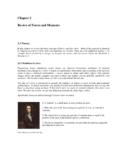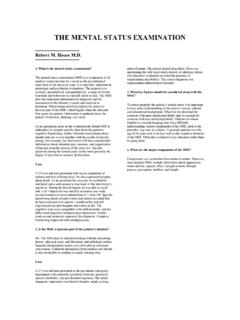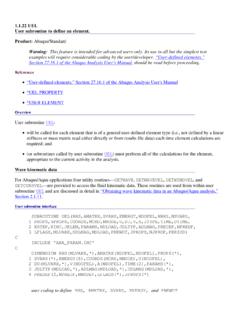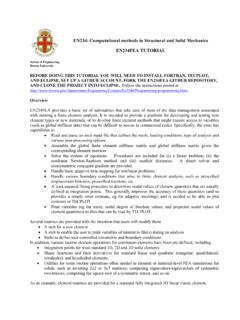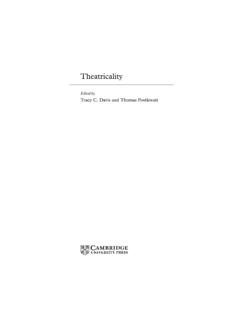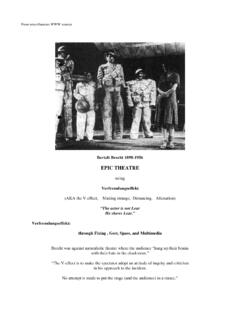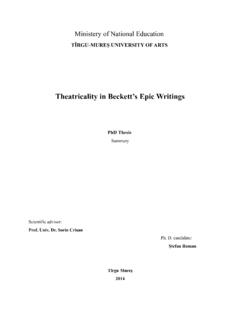Transcription of Theatricality as Medium - Brown University
1 SAMUEL WEBER Theatricality as Medium ",ttl ttl~ Fordham University Press New York 2004 Introduction: Theatricality as Medium THE E SSAYS that compose this book seek to respond to two sets of questions. First, how does it come about, and what does it signify, that, in an age increasingly dominated by electronic media, notions and practices that could be called "theatrical," far from appearing merely obsolete, seem to gain in importance? In other words, given that the Medium of theater and the effect of Theatricality presuppose, as one of their indispensable preconditions, some sort of real, immediate, physical presence, and given that the status and significance of such presence has been rendered increasingly problematic by the advent of the "new media," with their powerful "virtualizing" effects, one might expect to find that practices relating to theater and Theatricality would tend to diminish progressively in scope and significance.
2 Yet the contrary appears to be the case. Theatrical practices, attitudes, even organiza tions seem to proliferate, in conjunction with if not in response to the new media. Why is this happening, and what are its possible conse quences? The notions of "theater" and " Theatricality " are anything but self evident or unambiguous. They have a vexed and complex history, and only by articulating some ofthe major traits and tendencies ofthis history can we begin to investigate the renewed significance these terms are acquiring today. This brings me to the second set of ques tions to which I seek to respond. Second, how has theater been conceptualized in the West? I limit myself here to the Western European tradition and its sequels, not because non-Western theater and theatrical practices lack importance, on the contrary.
3 Non-Western theatrical practices have played a deci sive and detennining role throughout the long history of Western Theatricality AS Medium theater. In the twentieth century, they have inspired a critical reevalu ation of this history, most conspicuously in playwrights and theatrical thinkers such as Brecht, Artaud, Deleuze, Barthes, and Derrida. This rethinking has a much longer history, however. It emerges perhaps most significantly in the early part of the nineteenth century, in what might be called the "aftermath" of the Hegelian philosophical system and the culmination of thought it entails-in a writer-thinker such as Kierkegaard, for example-and it continues to mark the work of many of the most radical writer-thinkers of that century, such as Marx and Nietzsche, to name just the most obvious and influential.
4 In the Iwake of the exhaustion of a conceptual tradition based on a certain notion of identity, reflexivity, and subjectivity, theater and Theatricality emerge as names for an alternative that begins to articulate itself in the writings of these thinkers, although it certainly has far more complex a progeny than this limited list would seem to suggest. To understand just how a certain questioning of theater and Theatricality could as sume this function in the nineteenth century, we must first examine that against which such thinkers and dramaturges were reacting. In this emergence of theatrical language, figures, and concerns, it be comes clear that a battle is being fought to redefine the meaning and value of words such as theater and theatn'cality, and that this battle has a very long history.
5 It reaches back at least as far as Plato and Aristotle, in whose work the question of theater as Medium is posed, but only to be rapidly disposed of in a way that was to detennine much of the history-the thought and practice-of theater in the West. This tendency continues, even and perhaps especially today, to extend its influence in the world dominated by electronic media that have de veloped out of these same traditions. It is thus crucial to elaborate, as precisely as possible, just what the determining characteristics of this systematic conception of theater are, in order to discern alternatives to it, alternatives that have their own "history," which is quite distinct from that associated with "mainstream" versions. We will discover that an altelllati'. t~..th.~.~?~nant Western concept of th7 ater is already at work within the elabo'ration of ~he mainstream con cept.
6 It is not somethi~g-s'i~'ply i~p;;ed upon it from without, b~t accompanies it from the start-which is to say, from the initial effortS of Westem metaphysics to appropriate theater for its purposes. To understand what is at stake in this effort of appropriation, one need only return to a well-known and often-discussed fact: The ternl INTRODUCTION theater has the same etymology as the term theory, from the Greek word thi?a, designating a place from which :ye or to see. The fact that theater, like televis;;;;today,-has-always involv~d much "more than simply seeing only makes this privileging of sight all the more significant, and questionable.' The vai"orization ofsight over the other senses, especially hearing, which is implied in the currency of words such as theory and theater, but also television, often results from the desire to secure a position, from a distance that ostensibly permits one to view the object in its entirety while remaining at a safe remove from it.
7 This desire for exteriority has always felt b~Jh ~hreat ened biand-;maCteCitOa7~ainconcep"tion oJ'r! I will briefly discuss s~~eral instancesof tl1is' irrib[;"'alent tendency, one quite old and the others relatively recent. The Cave The first is the famous scene of the cave in Plato's Republic. This scene, designed to illustrate the limitations of ordinary human exis tence insofar as it is not enlightened by a philosophical perspective, involves the staging of a scenario with strong, if negative, theatrical connotations: "Picture men dwelling in a sort of subterranean cavern with a long entrance open to the light on its entire width. Conceive them as having their legs and necks fettered from childhood, so that they remain in the same spot, able to look forward only, and prevented by the fetters from turning their heads.]
8 Picture further the light from a fire burning higher up and at a distance behind them, and between the fire and the prisoners and above them a road along which a low wall has been built, as the exhib itors ofpuppet shows have partitions before the men themselves, above which they show the puppets." "All that I see," he said. "See also, then, men carrying past the wall implements of all kinds that rise above the wall, and human images and shapes of animals as well, wrought in stone and wood and every material, some of these bearers presumably speaking and others silent." "A strange image you speak of," he said, "and strange pris oners. " 2 3 AS Medium "Like to us," I said. "For, to begin with, tell me, do you trunk that these men would have seen anything of themselves or of one another except the shadows cast from the fIre on the wall of the cave that fronted them?
9 " "How could they," he said, "if they were compelled to hold their heads unmoved through life?" "And again, would not the same be true of the objects carried past them?" "Surely. " "If then they were able to talk to one another, do you not trunk that they would suppose that in naming the trungs that the'y saw they were naming the passing objects?" "Necessarily." "And if their prison had an echo from the wall opposite them, when one ofthe passers-by uttered a sound, do you think that they would suppose anything else than the passing shadow to be the speaker?" "By Zeus, J do not," said he. "Then in every way such prisoners would deem realiry to be nothing else than the shadows of the artifIcial objects" "Quite inevitably," he said. (514b-515cf The cave here is a particular kind oftheater, it is true, or a particular interpretation of theater, but it is unmistakably a theater nonetheless.)
10 Two traits mark the setting as being also a theater. First, the reader is invited to "picture" a defined, limited place. This placement-the arrangement of the place, the positioning of the people and things in it-is constitutive of what is taking place there. This is the first characteristic of a theater: the events it depicts are not indifferent to their placement. The second trait is the no less constitutive role of spectators. A theatrical scene is one that plays to others, called vari ously "spectators" or, in this case, more properly "audience," since in the cave "vision" and "visibiliry" are by no means the only media of perception involved. They are not the only media, but they are placed in a dominant, if problematic, position. What is characteristic of Plato's parable of the cave, however, is that the protagonists are above all spectators.
